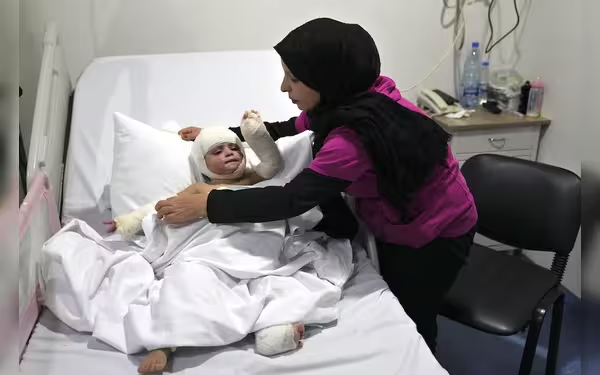Saturday, November 16, 2024 07:39 PM
Lebanon's Children Face Physical and Emotional Trauma from Ongoing Conflict
- Hundreds of children suffer from war-related injuries.
- Psychological scars are as severe as physical wounds.
- Urgent need for support and therapy for young victims.
 Image Credits: arabnewspk
Image Credits: arabnewspkThe ongoing conflict in Lebanon leaves children with severe physical and emotional trauma, highlighting the urgent need for support and healing.
In recent weeks, the ongoing conflict in Lebanon has taken a devastating toll on its youngest citizens. The war, which has escalated since September, has left hundreds of children grappling with both physical injuries and deep emotional scars. The situation is dire, as many families have been torn apart, and the innocence of childhood is being shattered by violence and loss.
One poignant example is the story of 4-year-old Hussein Mikdad, who, after surviving an Israeli airstrike that killed 18 members of his family, now faces a long and painful recovery. Clinging to his father, Hussein expressed his fear and confusion, highlighting the emotional turmoil that many children are experiencing. His father, Hassan, is left to navigate the challenges of both physical healing and the invisible wounds of trauma that his son now carries.
Doctors treating Hussein have confirmed that he is healing physically, but the psychological impact of the attack is much harder to assess. Children like Hussein are not just dealing with broken bones; they are also facing the reality of losing loved ones and the safety of their homes. As one of Hussein's surgeons, Imad Nahle, pointed out, "The trauma is not just on the muscular skeletal aspect. But he is also mentally hurt." This sentiment resonates with many medical professionals who are witnessing an alarming increase in the number of children affected by the violence.
In the past six weeks alone, over 100 children have lost their lives in Lebanon, with many more injured. The statistics are staggering: approximately 10 percent of the 14,000 wounded since last year are children. These young victims often suffer from severe injuries, including amputations and burns, leaving them with lifelong scars. Renowned surgeon Ghassan Abu Sittah expressed his concern, stating, "It leaves us with a generation of physically wounded children, children who are psychologically and emotionally wounded." This highlights the urgent need for comprehensive support for these children as they navigate their recovery.
As hospitals in Lebanon struggle to accommodate the influx of war casualties, the situation remains critical. Medical facilities are overwhelmed, with some centers increasing their capacity to treat the growing number of injured children. For instance, the Lebanese Hospital Geitaoui has expanded its services significantly to care for the rising number of burn victims, including 2-year-old Ivana Skakye, who suffered severe burns from an airstrike. Her mother, Fatima Zayoun, recounted the harrowing experience of the explosion, emphasizing the fear and chaos that engulfed their lives.
Fatima's story is just one of many that illustrate the profound impact of the conflict on families. She expressed her reluctance to return home, stating, "I saw death with my own eyes." This sentiment is echoed by many parents who fear for their children's safety in a war-torn environment. The psychological effects of such trauma can be long-lasting, as children grapple with the loss of their sense of security and safety.
As the conflict continues, the question remains: what does the future hold for these children? The ongoing violence has shattered their childhoods, leaving them to confront fears and uncertainties that no child should have to face. The need for healing—both physical and emotional—is more pressing than ever. It is crucial for communities and organizations to come together to provide support, therapy, and safe spaces for these young victims of war.
The plight of Lebanon's children amidst the ongoing conflict serves as a stark reminder of the human cost of war. As they navigate the challenges of recovery, it is imperative that we recognize their struggles and work towards a future where they can reclaim their childhoods, free from the shadows of violence and trauma. The resilience of these children is remarkable, but they need our support to heal and thrive in a world that has been turned upside down.













